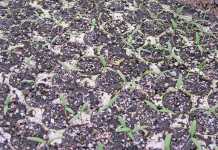This man was an 18th century English agriculturalist who introduced revolutionary stockbreeding methods for that time and age. Jip, and you thought genetics and genomics were revolutionary new things.
Anyway, Robert was born into a family of tenant farmers. He went to Europe to learn about other farming methods as a young man, very much like our young farmers nowadays. And on his return, also very much like our young ‘uns, he served an apprenticeship under his father until he took over the business in 1760. Nothing new under the sun!
Bakewell pioneered grassland irrigation, diverting rivers and building canals to flood the fields, and establishing experimental plots to test different manure and flooding methods.
His greatest contribution was in livestock breeding. Previously, livestock of both sexes was kept together in the fields with breeding resulting in many different breeds with their own unique, but random, characteristics.
Bakewell separated males from females, allowing mating only deliberately and specifically. Furthermore, by inbreeding his livestock he fixed and exaggerated those traits he thought were desirable.
I chanced upon this amazing man’s story on bbc.co.uk/history/historic-figures. Reading his story, I realised how forward-thinking he really was. And how much the world owes to the myriad of forward-thinking farmers through the ages.
Were it not for the farsightedness of people like Robert Bakewell we would have been hard-pressed to feed the ever-increasing number of people on the planet. Just page through any edition of Farmer’s Weekly and you’ll be left astonished by the ingenuity of the men and women in agriculture. Ordinary people with extraordinary ideas and plans that eventually add tremendous value to the entire industry.
That is exactly what Robert Bakewell did. He started with the old Lincolnshire breed of sheep and created the New Leicester. These sheep were big and delicately-boned, had good quality fleece and fatty forequarters, in keeping with the popular taste for fatty shoulder mutton.
He also began the practice of hiring out his prize rams to farmers to improve their own stock. He established the Dishley Society to maintain the purity of the New Leicester, but after his death taste in meat changed and the breed consequently died out. However, newer breeds still retain a lineage that’s founded on Bakewell’s sheep.
The only difference between our modern farmers and the pioneering Robert Bakewell is that every single successful farmer in SA is a visionary. They have to be in order to survive economically. They all play a decisive role, individually and collectively, to ensure the long-term sustainability and profitability of agriculture on the African continent.
I salute them and I salute Robert Bakewell!










